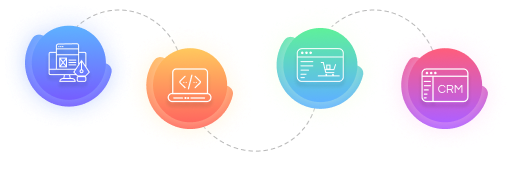
Semantic SEO: How to improve SEO strategy for Web 3.0 (Semantic Web)
What is Semantic SEO or Holistic SEO?
With every passing year, SEO is getting tougher and if you want to solidify your position in the search results, then you must keep yourself updated with the latest SEO trends, algorithms, and updates. As a part of a periodic update and to show more meaningful search results, Google is now ready with Semantic SEO. Web 3.0 or Holistic SEO
So, it’s time of the year for all the SEO experts, content writers, and digital marketing experts to understand the SEO update and make the necessary modifications in their SEO and content marketing strategies. But what is semantic SEO or Web 3.0 and what are the mandatory instructions to follow to increase the visibility and usefulness of your content in Google’s search results?
How Does Holistic SEO Work?
Holistic SEO emphasizes more on writing meaningful content. This SEO update urges you to build more meaning into the words you use in your content. When you write the contents, try to answer the questions as much as possible so that your users can get all the relevant information about the topic from a single source.
For instance: When you are writing a blog on Teeth Whitening keeping in mind the Semantic Update, then try to answer questions such as:
- What is teeth whitening treatment? How does the treatment work?
- How types of teeth whitening treatments available?
- What is the approximate cost of teeth whitening?
- And more.
Your website will enjoy more relevant traffic, and eventually, attain a good position in search results.
How to Write Content For Semantic SEO?
Semantic Search motivates you to find the reasons what people are looking for and how strategically you can place answers to those questions in your content. Try to address the searchers’ queries in the most meaningful manner. For writing such meaningful content, you can take the help of Google hints within the SERPs. Google’s “Related to Search” and, “People Also Ask” is the best place to find the references.
Contents offering more meaningful/related answers to search queries will rank higher in the search results and receive more organic traffic. In Semantic or Holistic SEO, the search algorithm tries to anticipate the next query from the searcher’s side; therefore, you need to write the contents in a way that is ready for the next question.
Semantic Search and Keyword Friendly Content?
Writing Semantic or Holistic SEO-friendly content is quite easy. Pick a keyword related to your business/products using a tool like Google Keyword Planner and try to address the most common topics that are discussed regarding your business/products.
How To Write SEO Friendly Content with The Help of Google?
Google is the most useful medium that will help you write the Semantic SEO-friendly content to drive more organic towards your website. You can also use the information on Google’s SERPs to build the block in the content. You can use the “searches related to” section to get a handful of ideas.
What is the Value of Semantic SEO?
Semantic or Holistic SEO will gradually gain pace and add value to your website in the search results. Keep your efforts on and enjoy the results. To learn more about the advantages of the value of Semantic SEO, you can contact SEO experts at Concept Infoway.
Frequently Asked Questions – FAQs
What is semantic search SEO?
Semantic SEO focuses on search intent and the meaning behind search queries, rather than just keyword matching. It enhances user experience by delivering more relevant results. At Concept Infoway, we implement semantic SEO to improve content structure and ensure your website aligns with how modern search engines understand context.
What is an example of semantic SEO?
An example is using related topics and structured data on a blog about “healthy recipes” to rank for queries like “easy meals for weight loss.” Concept Infoway leverages semantic SEO to make your content contextually rich and discoverable, improving visibility and user engagement across search platforms.
How to master semantic SEO?
Mastering semantic SEO involves understanding user intent, optimizing with related keywords, using schema markup, and writing comprehensive content. Concept Infoway’s SEO experts specialize in semantic SEO strategies, helping your website rank better, reach targeted audiences, and meet evolving search engine standards.
What are semantic keywords for SEO?
Semantic keywords are contextually related terms that support your main keyword. For example, “buying guide” or “best value” for a product page. Concept Infoway uses semantic SEO to incorporate these keywords naturally, boosting your site’s authority and relevance in search engine results.
Are semantics important for SEO?
Yes, semantics are vital in modern SEO, as search engines use NLP to understand context, synonyms, and user intent. Concept Infoway uses semantic SEO techniques to craft smarter content strategies that enhance discoverability, traffic quality, and overall search engine performance for your site.
What is web 3.0 in SEO?
Web 3.0 in SEO refers to the integration of semantic web principles, AI, and machine learning to deliver more personalized and accurate search results. At Concept Infoway, we align our SEO strategies with Web 3.0 trends, incorporating semantic SEO to future-proof your online presence and visibility.
What is semantic analysis in SEO?
Semantic analysis evaluates content meaning, relationships between words, and context relevance. It ensures your website content resonates with search engine algorithms. Concept Infoway applies semantic SEO through thorough analysis, improving your site’s clarity, content structure, and keyword targeting.
How does semantic search impact SEO?
Semantic search improves user experience and shifts focus from exact keywords to content quality and relevance. Concept Infoway helps businesses adapt to this evolution by integrating semantic SEO strategies that align content with searcher intent and enhance rankings across the digital ecosystem.

Hire Skilled and Experienced SEO Experts













